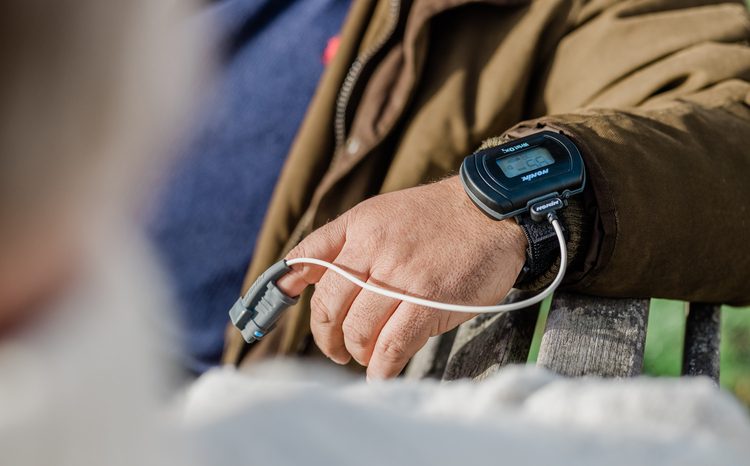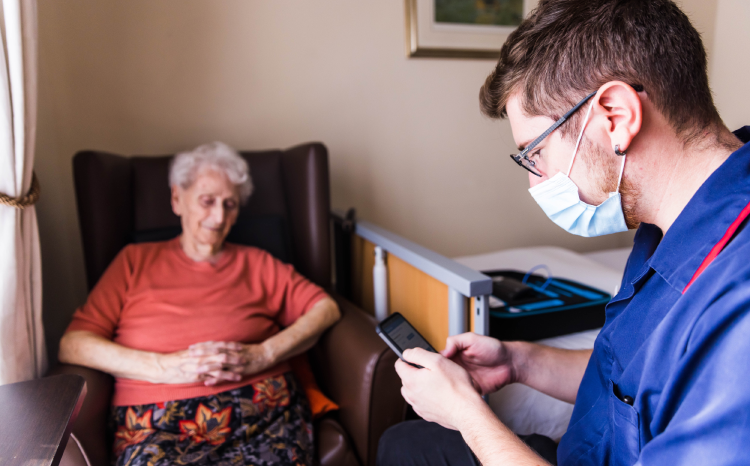Virtual ward created for atrial fibrillation patients in Leicester

University Hospitals of Leicester NHS Trust has become one of the first in the UK to create a virtual ward for patients with atrial fibrillation.
The scheme means people in Leicester experiencing an irregular heart rhythm can benefit from virtual monitoring in the comfort of their own home, surrounded by friends and family thanks to the new ‘connected care’ solution.
Patients with atrial fibrillation, commonly known as AF, have fast heart rates and would usually be admitted to hospital to spend two or more days there with close monitoring to assess response to the treatment they receive, but remote monitoring reduces the need to be managed in a hospital setting.
The scheme, which has been awarded £274,000 funding from NHS England’s Transformation Directorate (formerly NHSX) and is being run in association with health teach specialist Dignio, will provide a total of 120 virtual beds.
A pilot scheme has already seen patients receive special equipment to monitor their blood pressure, heart rate and oxygen levels as well as a device that produces an electrocardiogram (ECG) that gives detailed assessment of their heart rhythm.
Readings and symptoms are captured through the My Dignio app, which allows patient data to be automatically and securely transmitted to the hospital, where it can be viewed by clinicians remotely.
Dignio, which specializes in connected care solutions, has been successful in other health areas in various parts of the UK. The Salford Care Organisation have been using the Dignio app for almost a year after piloting it, to reduce unnecessary hospital admissions, much like in Leicester.
Ewa Truchanowic, managing director at Dignio, said: “We are really pleased to be working with the University Hospitals of Leicester NHS Trust. Our virtual ward solution is flexible enough to provide bespoke monitoring for a broad range of conditions, including AF. Our technology is helping to accelerate the world’s transition to connected care.”
The ‘My Dignio’ and ‘Dignio Care’ smartphone and tablet apps connect directly to its ‘Dignio Prevent’ data platform, which is used by clinicians to assess patients remotely in real-time.
Patients suffering with AF can have dizzy spells, palpitation and shortness of breath. AF affects between one and two percent of the general population or one in 10 people over the age of 70 and increases the risk of stroke by five times.
University of Hospitals Leicester NHS Trust has participated in international research into AF treatments and recently took part in a study which pioneered the concept of early treatment for AF patients, which was specifically designed to prevent strokes.
Professor Andre Ng, consultant cardiologist and electrophysiologist at University Hospitals of Leicester NHS Trust and professor of cardiac electrophysiology and head of the Cardiovascular Sciences Department at the University of Leicester, said: “This is a glimpse into the future of care for patients with atrial fibrillation.
“This brand-new service gives patients the opportunity to be managed and recuperate in their own homes whilst their heart rhythm settles back to normal but with the peace of mind that they’re still being monitored by specialist clinicians.
“We’re really pleased that our work is recognised with the Digital Health Partnership award and proud that Leicester is leading the way on this.”
This is not the only virtual ward that University Hospitals of Leicester have opened in the last couple of years. Last year they opened a virtual Covid ward to support coronavirus patients with moderate disease.






4 Comments
Dignio doesn’t say it is ISO 27001 or 13485 compliant.
Doesn’t this mean unlimited fines and criminal prosecution?
Dear PG Khan,
Please see below some information on Dignio standards. For more information please visit our website dignio.uk
Dignio’s services are developed in line with our Quality Management System for medical devices, which is compliant with ISO 13485 for medical device quality management and ISO 27001 for information security management. Furthermore, the software development process is designed in compliance with IEC 62304:2006, which is based on agile principles that include adaptive planning and continuous deliveries within a set of frameworks that ensure robust and secure software solutions.
This is very innovative. Digital health options in recent times complement the challenges and strain on current resources in the wake of the covid 19 pandemic.
Thank you for your comment. A well designed methodology and tech, deployed in close collaboration with the clinicians and patients, can really make a difference to those delivering and receiving care.
Comments are closed.